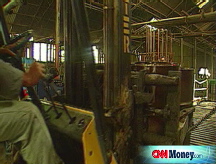Oil jumps higher
Contract remains near 21-month low as crude stockpiles show no change, and stocks bounce off of 5 year lows.

NEW YORK (CNNMoney.com) -- Oil prices rebounded from a 21-month low Thursday as equity markets recovered and investors weighed the possibility that OPEC may pledge another production cut before the end of the month.
U.S. crude for December delivery ended the day up 2.08 cents to $58.24 a barrel in New York. The contract settled Wednesday at $56.16, its lowest level since late January 2007.
Over the past several weeks, commodity investors have been looking to stocks to get a long-term view on the health of the economy, according to James Cordier, founder of commodities brokerage OptionSellers.com.
On Thursday the Dow Jones industrial average rallied after hitting 5-1/2 year lows.
Markets around the world were mixed, with France and Germany seeing small gains. However Hong Kong and Japan each lost more than 5%.
OPEC mulls early meeting: Oil prices also got a boost as investors saw reports that the Organization of Petroleum Exporting Countries is considering an early meeting to discuss production cuts.
Last month the group pledged to cut production by 1.5 million barrels a day. OPEC is currently scheduled to meet Dec. 17 in Algeria but reports have emerged that a meeting could take place near the end of this month.
OPEC President Chakib Khelil, who is also the oil minister of Algeria, reiterated statements made over the past several weeks that the organization could consider another production cut if the planned production cut doesn't halt oil's decline, according to media reports.
Meanwhile, Iranian OPEC governor Mohammad Ali Khatibi said that the group was discussing the possibility of holding an organization-wide meeting as early as Nov. 28 in Cairo to address the ongoing problem, according to reports.
Ecuador, also an OPEC member, reportedly said it had been invited to attend that meeting.
Other reports said a meeting was possible on Nov. 29. The Organization of Arab Petroleum Exporting Countries, many of whose members also belong to OPEC, was already scheduled to meet in Cairo on that date.
Should OPEC cut production again, "short-term it's bullish, but long-term it's just another reminder to the market just how bad demand is," said Phil Flynn, senior market analyst with Alaron Trading in Chicago.
"People are still fearful whenever OPEC jawbones about cutting production," added Cordier.
Inventories: Meanwhile a report on U.S. petroleum stockpiles was mixed, and had little effect on crude prices.
The Energy Department said crude stocks remained unchanged last week, while gasoline stockpiles rose by 2 million barrels, and supplies of distillates, which are used to make diesel fuel and home heating oil, rose by 600,000 barrels.
Analysts surveyed by industry tracking firm Platts expected a 1.1 million barrel increase in crude supplies, an 850,000 barrel rise in gasoline stockpiles, and a 1 million barrel gain in distillates.
The inventory report was delayed a day due to the U.S. Veterans Day holiday on Tuesday.
Crude prices have fallen more than 60% since hitting a record high of $147.27 a barrel in mid-July, as the global economic slowdown has caused major worries among commodity investors about falling worldwide demand.
"The way demand is falling, it doesn't matter even if you cut back production," said Flynn, referring to a possible OPEC cut.
Slowing demand: In order for a second OPEC cut to have a lasting effect on oil prices, both the equity markets and the outlook for the global economy would need to show improvement, said Cordier.
Over the past several months, oil prices have been trending downward as signs emerged that the slowing economy was having an impact on oil demand.
The economy of Germany, Europe's largest, slipped into a recession in the third quarter, according to government reports, and the rest of the developed world, including the United States, the world's largest oil consumer, will likely follow in 2009, according to the Organization for Economic Cooperation and Development.
"Anyone who is thinking this was going to be a shortened slowdown - they're rethinking that," said Cordier. ![]()




